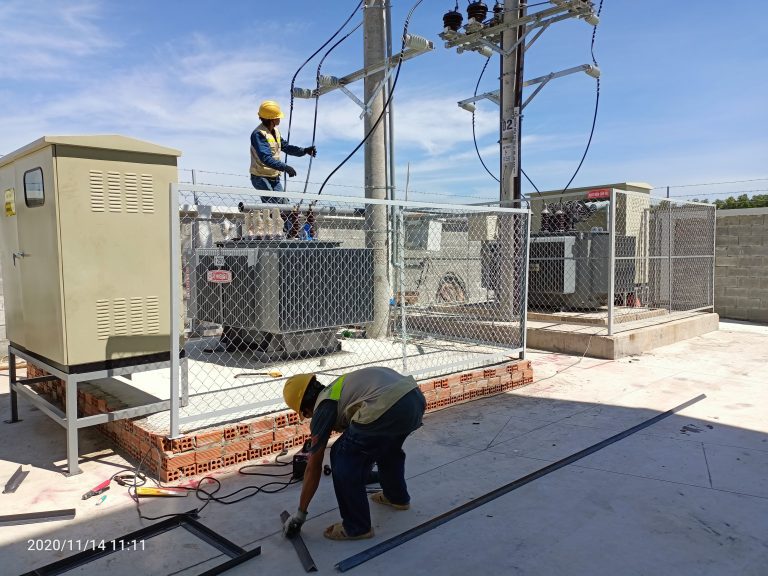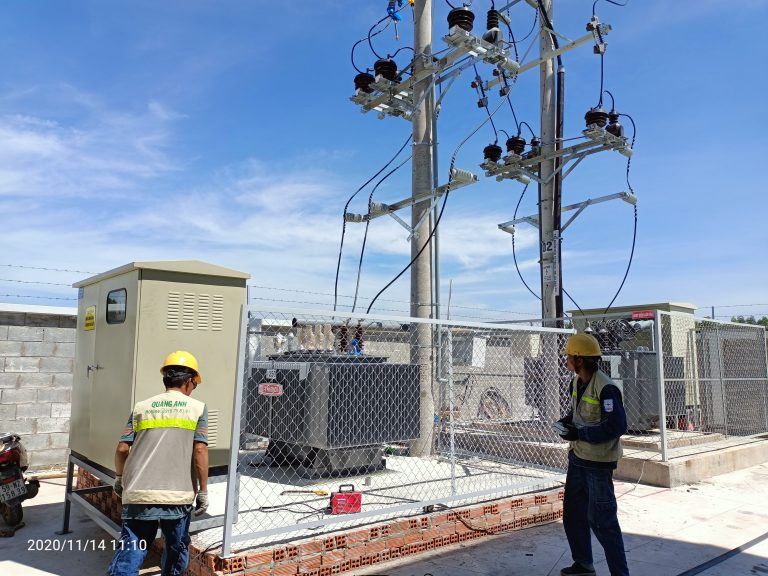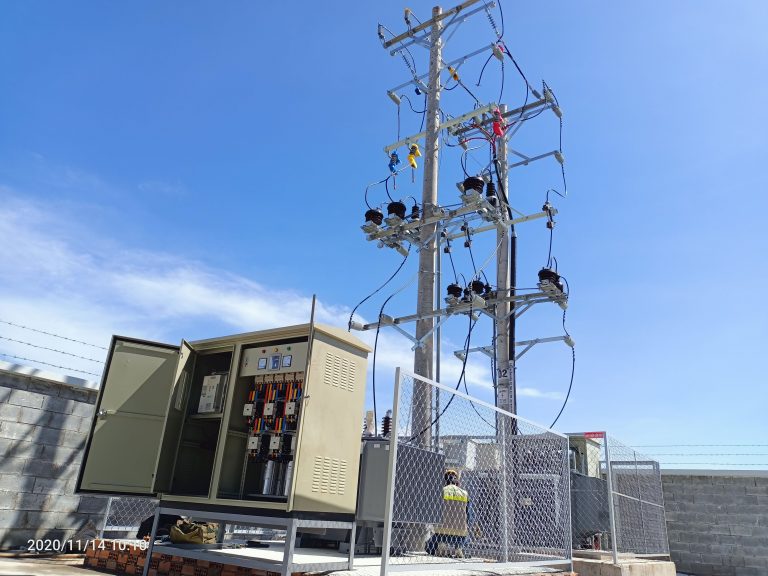Tin Tức
Industrial Electrical Construction: Overview and Process
Industrial electrical construction involves the design, installation, inspection, and maintenance of electrical systems in industrial structures such as factories and plants. Its main purpose is to meet the electricity needs for production and business operations.
Detailed Industrial Electrical Construction Process
The process of industrial electrical construction includes designing the electrical system as per customer requirements, preparing necessary materials and equipment, installing the electrical system, inspecting and testing the entire system, performing periodic maintenance and repairs. The design and installation of the power supply system and lighting equipment ensure continuous and safe electricity supply.
Industrial electrical construction is a process requiring high precision and safety. The following content delves into each detailed step of this process to ensure the electrical system operates efficiently and meets customer demands.
Preparation of Equipment and Site Survey
- Preparation of equipment: Necessary equipment such as transformers, electrical cabinets, conductors, protective devices, controllers, etc., must be identified and thoroughly prepared before starting the construction process. These devices play a core role in ensuring the safety and efficiency of electrical construction.
- Site survey: Conduct on-site surveys to gather complete information about the project’s location, electricity load requirements, and specific customer demands. This process lays the foundation for accurately and suitably designing the electrical system.
Designing Electrical System Drawings
- Create design drawings: Based on collected information, engineers create detailed design drawings, integrating technical standards to ensure the safety and efficiency of the system. These drawings require accuracy in every detail and technical symbols.
- Approval of drawings: Before construction, the drawings must be reviewed and approved by the customer to ensure they meet all proposed technical and electrical construction safety requirements.
Construction and Installation of Electrical Systems
- Install transformers and electrical cabinets: This is the first step in the installation process, supplying and managing electricity sources effectively.
- Pull conductors and signal cables: Follow the approved drawings to ensure conductors and signal cables are optimally laid out for future maintenance and repair.
- Install electrical equipment: Install devices such as switches, protective gear, measuring instruments, control panels, lighting systems, and cooling systems. This process requires careful techniques to ensure electrical construction safety.
Inspection and Completion
- System inspection: After installation, inspect the entire system to ensure safe and stable operation.
- Completion and testing: Conduct necessary tests to ensure the system operates according to design and meets safety standards.
Acceptance and Warranty
- System acceptance: The final phase is to accept the system to ensure it meets standards without errors.
- Warranty and maintenance: Provide warranty and periodic maintenance services to maintain stable and safe system operation over time.
Industrial electrical construction is not just about installation and inspection, but it requires detailed segregation in the process and continuous cooperation among stakeholders to achieve optimal efficiency.

Necessary Skills in Industrial Electrical Construction
Necessary skills include extensive expertise in industrial electricity, skills in designing, installing, and maintaining electrical systems, along with the ability to use tools and software to support construction. Additionally, skills in working with control systems and industrial automation are vital.
Specialized Knowledge in Electrical Engineering
Industrial electrical construction demands extensive understanding of electrical and electronic theories. Engineers need to grasp the operating principles of electrical systems, including electrical and electronic circuits. Moreover, knowledge of electrical materials and devices, such as operation methods and types of products from brands like ABB, Mitsubishi, or Schneider, is crucial.
System Design and Implementation
Electrical system design skills are necessary in industrial electrical construction, including selecting appropriate devices and ensuring compliance with electrical safety standards. This comes with the ability to plan construction processes, clearly determine procedures, timelines, and budget requirements for the project.
Analytical and Problem-Solving Skills
Engineers need the ability to diagnose and analyze electrical malfunctions to perform effective repairs. Critical thinking and creativity are also important elements that help evaluate data to propose rational solutions for complex issues during construction.
Communication and Teamwork Skills
In the industrial electrical work environment, effective communication is key to conveying technical information to colleagues and stakeholders. Additionally, good teamwork skills will support the collaborative process in construction.
Knowledge About Standards and Regulations
Understanding national and international electrical standards, such as NEC, IEC, IEEE, is indispensable. Furthermore, ensuring compliance with electrical work safety regulations will help prevent risks during construction.
Project Management Skills
The ability to manage electrical projects, from planning, organizing to time, resource, and budget management, is essential. Engineers need to understand how to identify and manage potential risks to ensure the progress and effectiveness of the project.
Ability to Read and Understand Technical Documents
The ability to read and understand diagrams and technical documents is mandatory. Engineers need to clearly understand technical instructions to perform tasks accurately.
Repair and Maintenance of Electrical Systems
Repairs and maintenance measures need to be carried out to ensure the stable and safe operation of the electrical system, which helps extend the lifespan of devices and systems.
Safety Skills
Finally, safety skills include understanding and complying with electrical work safety regulations and the ability to identify, avoid accident risks.

Future of the electrical construction sector
With technological development, the demand for industrial electrical construction is increasing, requiring skilled personnel in system design, construction, and maintenance. The electrical engineering sector plays an important role in training workforce with solid knowledge to meet the ever-growing market demands.
Increasing Demand for Electricity Usage
The industrial electrical construction sector plays an essential role in maintaining stable operations of electrical systems. Electricity not only serves production and business but is also an indispensable energy source in daily life. This increase creates great opportunities for the construction and development of industrial electrical systems, thereby contributing to economic growth.
Economic Development and Industrialization
The industrialization process in Vietnam is robustly progressing, leading to high demand for industrial electrical construction. The expansion of industrial zones means integrating more advanced electrical technology to ensure efficient and safe operations. Industrial electrical personnel are currently in high demand in the market.
Employment and Development Opportunities
Graduates in industrial electrical engineering will find a vast job market. Large companies, factories, and industrial parks constantly seek skilled engineers and technicians. These individuals also have the opportunity to start their own business by setting up construction-related firms.
Integration of Technology and Innovation
The 4.0 industrial revolution is driving the necessity to apply advanced technologies such as automation, digitization, and smart technology into industrial electrical systems. This not only enhances performance but also meets modern requirements for operating and managing electrical systems.
Contributing to Environmental Protection
The industrial electrical sector is focusing on using renewable energy such as solar, wind, and hydropower to meet clean energy demands, contributing to environmental protection and minimizing negative impacts from fossil energy use.
High Demand for Quality Manpower
With the growing demand for manpower, many training institutions have adopted a combined theoretical and practical learning model to enhance graduation quality. This improves the technical capabilities of students and helps them easily adapt and find suitable jobs after graduation.

Industrial electrical construction is a crucial field in industrial structures, ensuring that production and business activities occur continuously and safely. Mastering skills and knowledge in this field will bring technical, investment, and long-term strategic benefits.
Contact QuangAnhcons via Hotline: 09 1975 8191 for consultation and support on the most effective industrial electrical construction solutions.
QuangAnhcons provides design, installation, and maintenance services for industrial electrical systems, ensuring quality and safety to the highest standards.